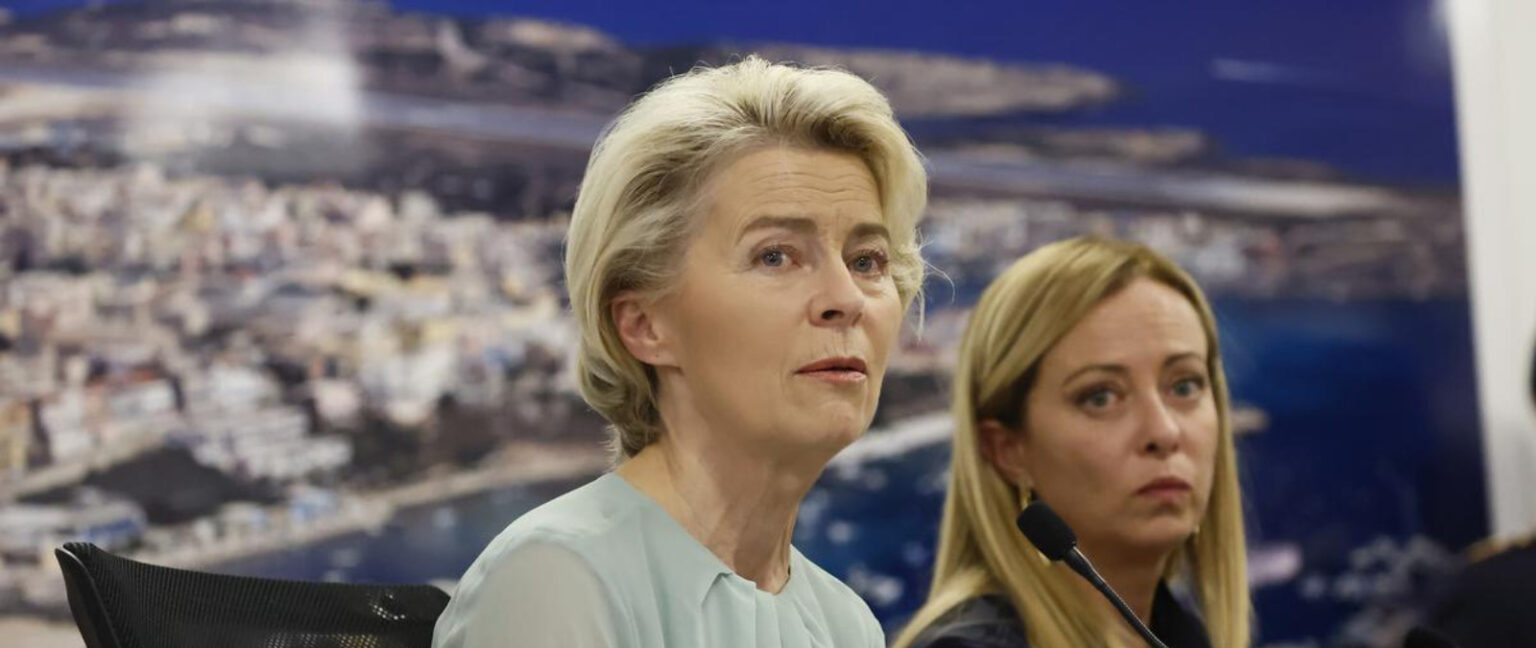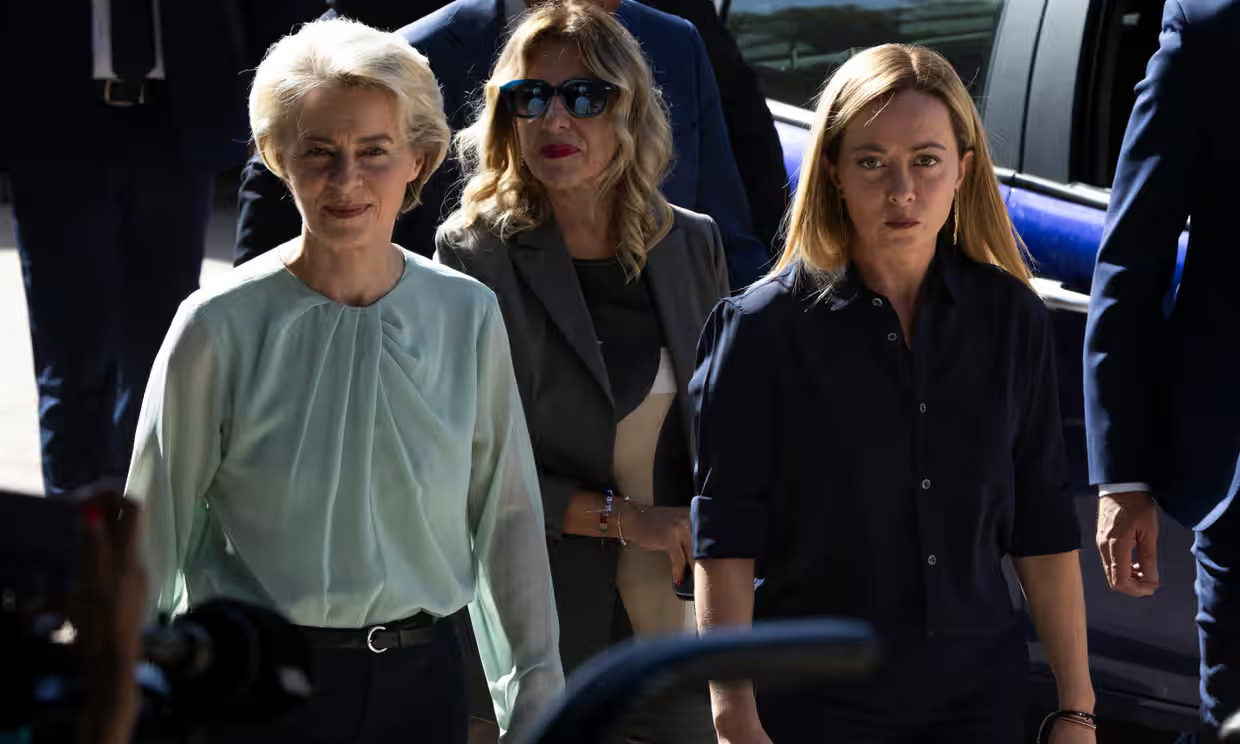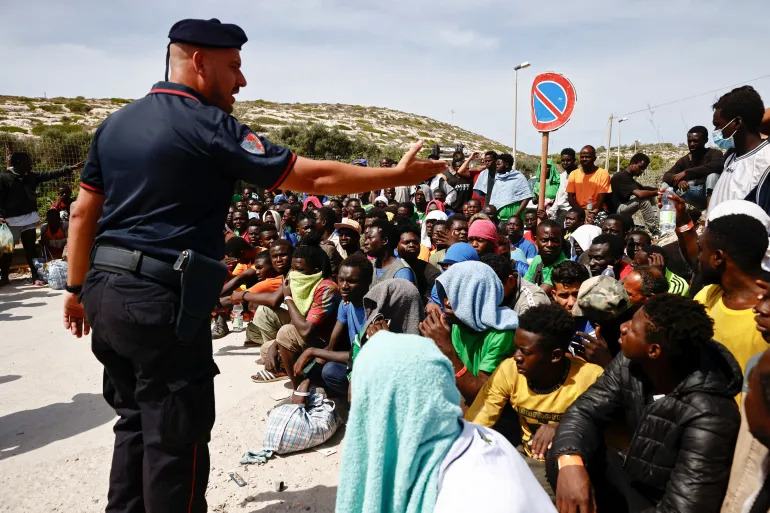On Sunday morning, Giorgia Meloni and Ursula von der Leyen, the head of the European Commission, visited the tiny Sicilian island, which for many years has been the first stop for travelers attempting the perilous maritime trek from North Africa.
After hundreds of refugees arrived on Lampedusa in the past week, Italy’s prime minister declared that European nations must cooperate “to stop departures [from Africa]” and rapidly deport those who were denied asylum and “threaten the future of Europe.”
The three-hour visit occurred after over 8,500 people landed within three days last week – more than the island’s population of 6,000. It included a stop at an overcrowded reception center and a spot near the port that contained the ruins of flimsy boats used by migrants.
On Saturday morning, the remains of a baby who passed very soon after birth aboard a boat carrying 40 people were placed in a white casket and transported to the island’s cemetery. A five-month-old boy drowned last week while being rescued.
Migrant influx
Image source: The Guardian
Recently, there have been tumultuous scenes at the receiving center, which can barely accommodate 400 people, with migrants trying to scale a fence and others sleeping on the street outside that is littered with trash. However, by the time Meloni and Von der Leyen arrived, the majority had been sent to centers in Sicily or the Italian mainland, and the landscape surrounding the center had been made to appear nearly spotless.
Meloni, whose far-right government came to power in October, said the influx threatened “the future of Europe” and that “serious solutions” were required, including cracking down on people smugglers, swiftly deporting illegal immigrants, and hastily putting into effect a deal signed this year with Tunisia.
Ursula Von der Leyen’s response
Von der Leyen pledged a crackdown on the “brutal business” of people smuggling as well as the prompt expulsion of individuals who are refused refuge. Who enters the European Union and under what conditions will be decided by us. not the smugglers, she emphasized.
In her list of ten recommendations, she mentioned helping Italy deal with recent arrivals while “exploring options to expand existing naval missions in the Mediterranean, or to work on new ones.” In order to lessen the burden on Italy, Von der Leyen also urged member states to employ a procedure that allows them to accept migrants freely.
On the other hand, newcomers keep coming to the island. The majority had left Tunisia, where Meloni and Von der Leyen had struck a contentious £105 million agreement to stop irregular migration, in July. Even though no money has yet been exchanged, there has been criticism that the number of migrants arriving in Italy from Tunisia has increased by about 70% in the months following the agreement, which experts ascribe to the pleasant weather.
More than 127,000 people have touched down on Italian soil so far in 2024, more than twice as many as during the same period last year.
Responsibility of the European Union
Image source: Reuters
The most recent crisis has sparked a discussion about how responsibility should be allocated among EU member states and prompted doubts about the viability of agreements with north African nations.
For more than 30 years, Lampedusa, which is located closer to Tunisia than Sicily, has dealt with the influx of people from north Africa. But on the island, tolerance is running out. Concerns that it would become a “tent city” have led to protests from the locals.
Meloni hopes the agreement with Tunisia would help find a solution to his election campaign promise to stem illegal immigration. The EU has insisted that the funding given to Tunisia would be used, and it is now refitting 17 vessels for use in search and rescue efforts by the Tunisian government.
However, the refusal of admission to a group of MEPs from the European parliament has renewed doubts about President Kais Saied’s resolve to address issues of human rights abuses. He has said before that Tunisia will not serve as Europe’s border guard.
Meloni was the driving force behind the EU migration deal, but it has the support of the rest of Europe because migration is considered as a crucial issue in upcoming elections, especially in Poland and the Netherlands.
As part of the agreement with Tunisia, an additional £150 million is available to support economic reforms and strengthen trade connections with Europe, notably in the field of renewable energy.















